10 Types of Google Penalties and How to Avoid Them
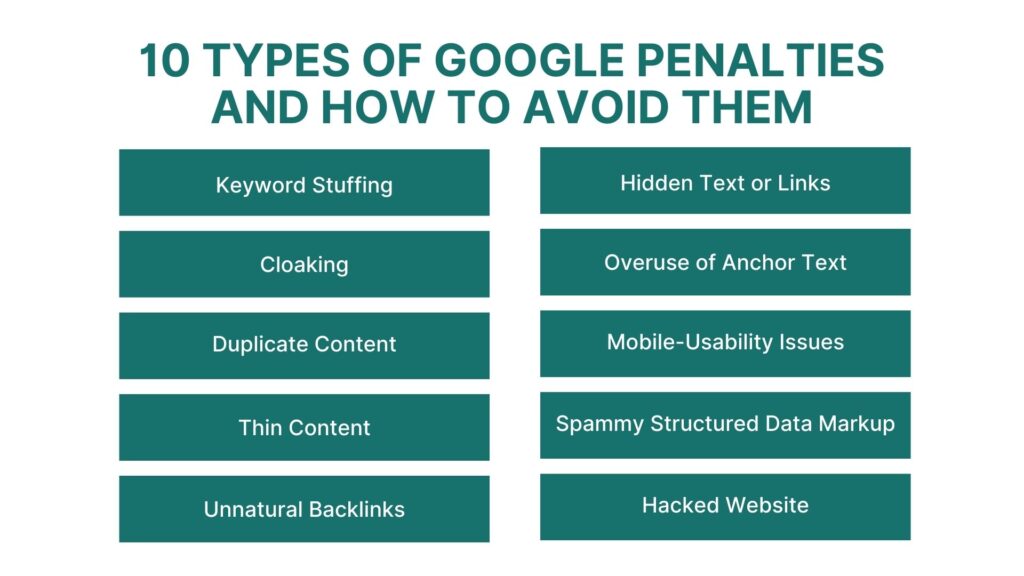
When it comes to maintaining a strong online presence, following Google’s rules is essential. Google’s search algorithm uses various guidelines to rank websites, and breaking those rules can lead to penalties. These penalties can dramatically lower your site’s rankings or even remove your pages from search results entirely.
Understanding the different types of Google penalties and how to avoid them is crucial for protecting your site and maintaining good SEO performance. In this post, we’ll cover 10 common types of Google penalties, explain what causes them, and provide actionable tips to stay on Google’s good side.
In this article:
- What Are Google Penalties?
- 10 Google Penalties to Avoid
- How to Recover from a Google Penalty
- Tips to Avoid Google Penalties
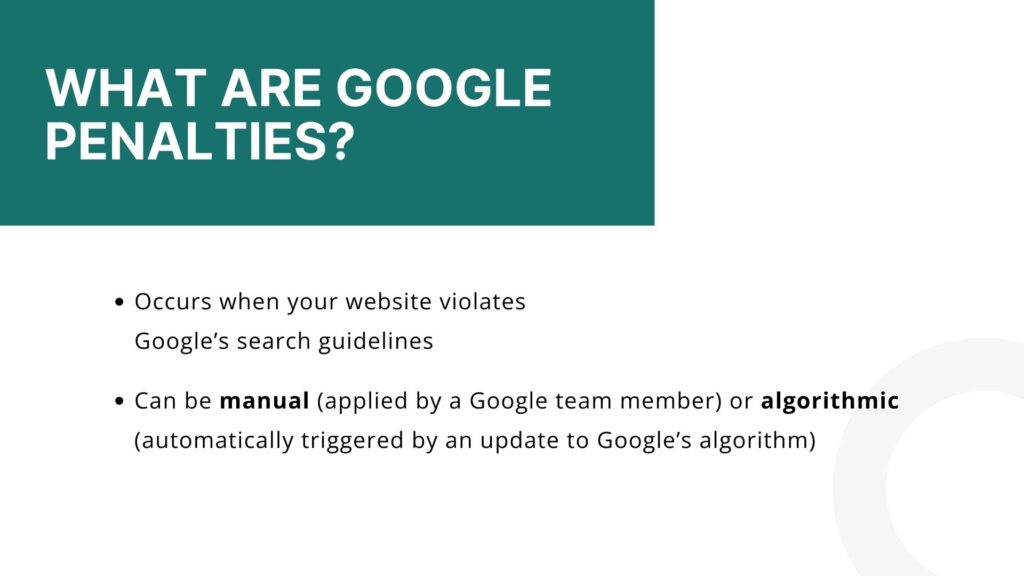
What Are Google Penalties?
A Google penalty occurs when your website violates Google’s search guidelines. Penalties are either manual (applied by a Google team member) or algorithmic (automatically triggered by an update to Google’s algorithm). Penalties can affect your site’s online visibility, rankings, and direct traffic.

10 Google Penalties to Avoid
Here are the most common types of penalties and what you can do to prevent them:
1. Keyword Stuffing
Keyword stuffing involves overusing keywords in your content in an unnatural way to manipulate rankings. One example is a blog post repeating the phrase “cheap shoes online” in every sentence.
Avoid it by using keywords naturally and sparingly. Focus on writing for user queries, not just search engines. Incorporate synonyms and related terms.
2. Cloaking
Cloaking occurs when a website shows different content to users than it shows to search engine crawlers. For example, a website displays a clean version of a page to Google but shows spammy ads to users.
Ensure your website delivers the same content to users and search engines. Avoid deceptive practices to trick algorithms.
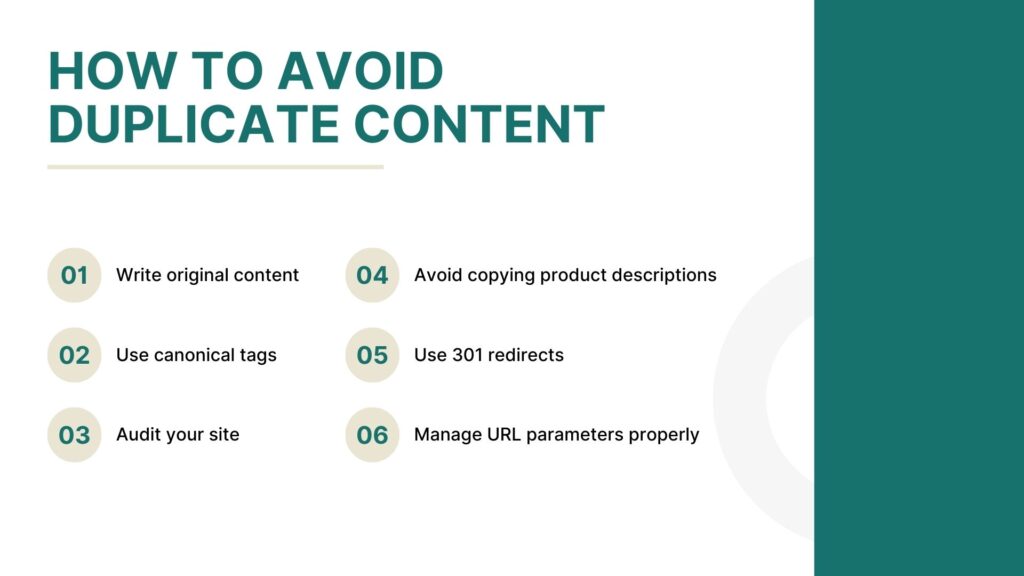
3. Duplicate Content
Google penalizes websites that copy content from other sites or have identical pages within their own site. Don’t copy and paste content from another blog without adding unique value. This can be a major problem in content aggregation and auto-generated content.
Always write original, high-quality content. Use tools like Copyscape to check for duplicate content. Canonicalize duplicate pages if necessary.
4. Thin Content
Thin content refers to pages with little or no value to users, such as automatically generated content, doorway pages, or scraped content. Provide detailed, useful information in your content. Avoid relying on auto-generated text or filler.
5. Unnatural Backlinks
Google penalizes sites with spammy or low-quality backlinks. These often come from paid links, link farms, or irrelevant websites.
Build backlinks naturally by creating valuable content. Avoid buying links or participating in link schemes. Regularly audit your backlink profile and disavow harmful links.
Link Genius can help you find relevant backlinks at scale. That way, you can focus on reaching out to potential guest post sources and nurture valuable partnerships with them.
6. Hidden Text or Links
Hiding text or links by making them invisible to users (e.g., matching text color to the background) is considered deceptive. Ensure all text and links are visible to users. Don’t hide keywords or links for the purpose of manipulating rankings or spamdexing.
7. Overuse of Anchor Text
Using exact-match anchor text excessively in your backlinks can appear manipulative to Google. Use a mix of branded, generic, and descriptive anchor text. Avoid over-optimizing backlinks with exact-match keywords.
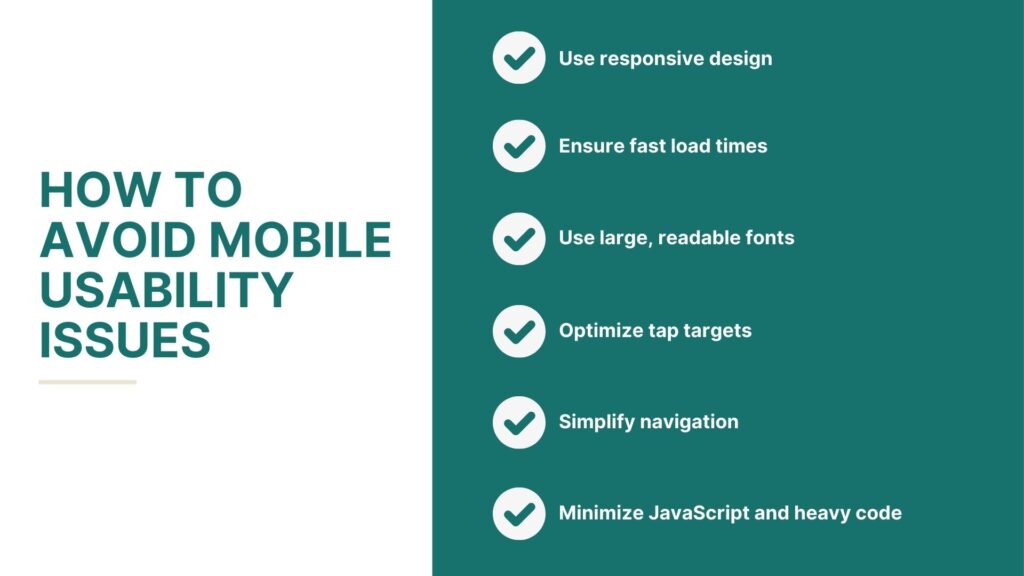
8. Mobile-Usability Issues
If your website isn’t mobile-friendly, it may receive a penalty, especially since Google uses mobile-first indexing. Use responsive design to ensure your site adapts to different devices. Test your site’s mobile usability by measuring click depth and other engagement metrics. Optimize load times for mobile users.
9. Spammy Structured Data Markup
Google penalizes websites that misuse structured data markup to provide false or misleading information in search results. For example, adding fake reviews or star ratings to your structured data.
Use structured data only for accurate and relevant information. Follow Google’s guidelines for structured data markup.
10. Hacked Website
If your website is hacked and used to distribute spam or malicious content, it can be penalized or removed from search results. Use strong passwords and keep your software up to date. Regularly monitor your website for unusual activity. Set up Google Search Console alerts to notify you of potential security issues.
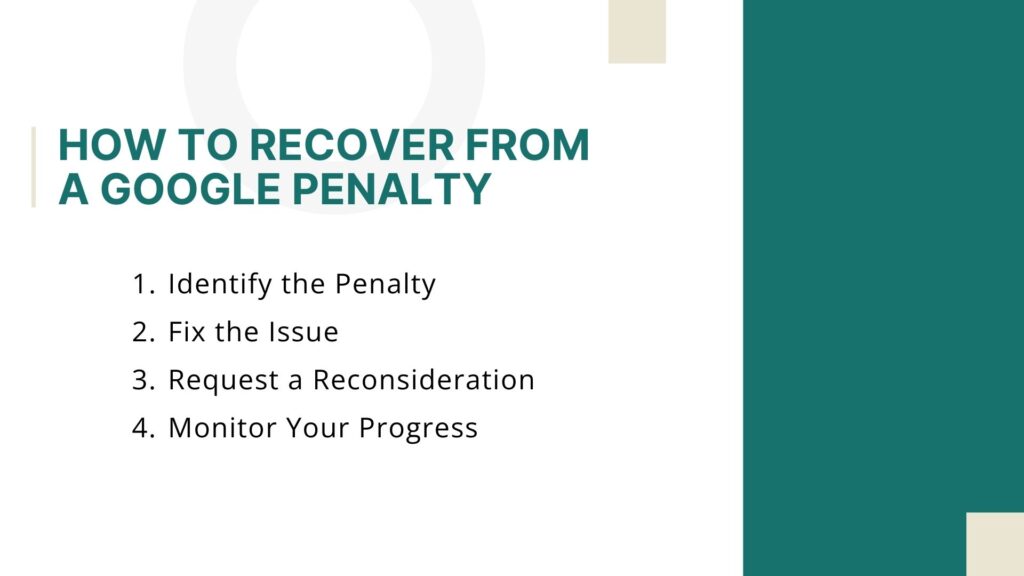
How to Recover from a Google Penalty
If you’ve been penalized by Google, don’t panic. Here are the steps to recover:
1. Identify the Penalty
Check Google Search Console for any manual action notices. Use tools like SEMrush or Ahrefs to analyze traffic drops that may indicate algorithmic penalties.
3. Fix the Issue
Address the specific violation. For example, remove unnatural backlinks or rewrite thin content. Follow Google’s guidelines closely to ensure the issue is fully resolved.
3. Request a Reconsideration
If you’ve received a manual penalty, submit a reconsideration request through Google Search Console once you’ve fixed the issue. Be transparent about what changes you made.
4. Monitor Your Progress
After resolving the penalty, monitor your site’s traffic, rankings, and performance to ensure you’re on the right track.
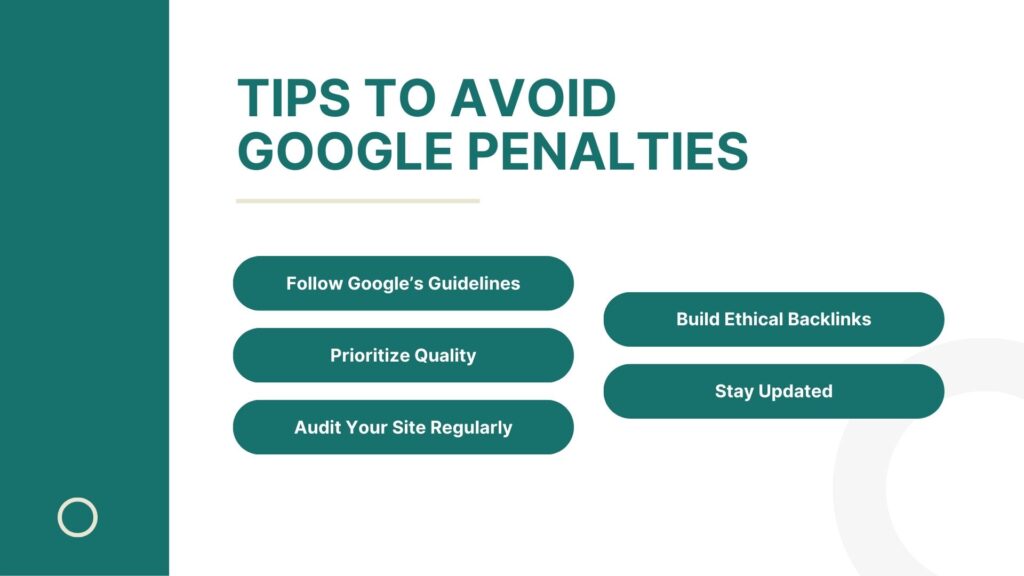
Tips to Avoid Google Penalties
Prevention is better than cure! Here are some best practices to avoid penalties in the first place:
1. Follow Google’s Guidelines
Regularly review Google’s Search Essentials (formerly Webmaster Guidelines) to stay informed about best practices. Ignoring these rules, even unintentionally, can result in penalties that take time and effort to recover from.
2. Prioritize Quality
Focus on creating high-quality, original content that provides value to users. Google rewards websites that consistently produce useful, well-researched, and engaging content that meets user intent.
3. Audit Your Site Regularly
Use tools like Google Search Console and Ahrefs to identify and fix potential issues before they result in a penalty. Conducting routine audits helps catch and correct technical errors, broken links, and outdated content that could impact your rankings.
4. Build Ethical Backlinks
Focus on earning backlinks from reputable, relevant websites rather than buying or spamming links. Building a natural backlink profile through guest posts, collaborations, and high-quality content helps boost SEO without violating Google’s guidelines.
5. Stay Updated
SEO is constantly evolving. Keep up with algorithm updates and industry trends to ensure your strategies remain compliant. Following SEO news and best practices will help you quickly adapt to changes and stay ahead of competitors.
Stay Compliant
Google penalties can have a significant impact on your website’s performance, but they’re avoidable if you follow the rules. Stay focused on creating valuable content, earning high-quality backlinks, and optimizing your website for both users and search engines. With the right approach, you can keep your site penalty-free and thriving.
Build ethical, high-quality backlinks with Link Genius. Stay ahead of the competition with smarter outreach strategies that align with Google’s guidelines. Book a demo today!
